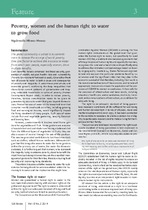| dc.description.abstract | The global community is united in its commitment to remove the scourge of world poverty. One core factor to achieve this is access to water
from which poor people, especially women, draw multiple benefits. Such benefits include enhanced livelihood security, generation of wealth, reduced health risks and vulnerability (Poverty Environment Partnership 2006). On another front lack of access to water is both a cause and consequence of poverty and inequality. It undermines productivity and economic growth, reinforcing the deep inequalities that characterise current patterns of globalisation and trapping vulnerable households in cycles of poverty (Human Development Report 2006). In order to reduce poverty, therefore, serious consideration needs to be given to guaranteeing access to water that goes beyond domestic uses. Productive uses of water at the household level that comprise mainly small-scale activities, including growing food and earning an income, would significantly impact the living standards of many people. Such uses of water include fruit and vegetable gardening, keeping livestock
and brewing beer. | en_US |

